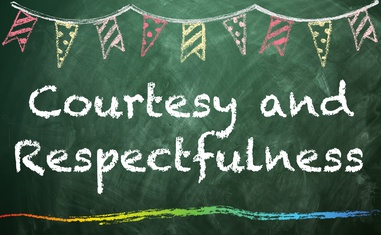In the intricate tapestry of Bahá’í teachings, the virtues of courtesy and respect loom large. These attributes serve as foundational pillars in the edifice of human relationships, fostering harmonious interactions and enabling the flourishing of a cohesive community. This article endeavors to explore the essence of courtesy and respect within the Bahá’í framework, delineating practical strategies for the cultivation of these essential virtues.
First and foremost, it is essential to elucidate the concept of virtue itself. In Bahá’í philosophy, virtues are viewed as qualities that draw individuals closer to the divine and facilitate the betterment of society. They are not merely abstract ideals; rather, they are actionable traits that can be embodied in daily life. Among these, courtesy and respect stand out due to their far-reaching impact on interpersonal and communal relations.
To comprehend how to be more courteous and respectful, one must first grasp the significance of these virtues. Courtesy involves a proactive disposition towards kindness and consideration. It manifests in the manner we engage with others, as well as the respect we show for their feelings and opinions. Respect, on the other hand, is grounded in the recognition of the inherent worth of every individual, regardless of their background or beliefs. It is a conscious acknowledgment of the dignity and potential that resides within all human beings.
These virtues are interrelated, often intertwining in practice. For instance, a courteous engagement invariably invites respect, and vice-versa. To begin cultivating these virtues, one must embark upon a journey of self-awareness. Self-awareness involves introspection and the critical examination of one’s thoughts, feelings, and behaviors in relation to others. Such scrutiny will illuminate areas where one may inadvertently fall short in demonstrating courtesy or respect.
Moreover, the practice of active listening emerges as a pivotal strategy in embodying these virtues. When engaging in conversation, it is imperative to give one’s full attention to the speaker. This involves not only hearing their words but also discerning their emotional undertones. Active listening communicates respect, as it acknowledges the speaker’s perspective and validates their experience. To deepen this engagement, one might employ reflective listening, where one paraphrases or summarizes what has been said, ensuring both clarity and understanding.
Another crucial aspect of exhibiting courtesy is the use of language. Words wield immense power; they can either uplift or belittle. Employing polite and considerate language—whether in verbal exchanges or written communications—can significantly affect how one is perceived. Simple gestures such as saying “please” and “thank you,” or expressing appreciation, can foster an environment of mutual respect and goodwill.
Furthermore, non-verbal communication plays an indispensable role in conveying courtesy and respect. Body language, facial expressions, and tone of voice can reinforce or undermine one’s verbal messages. Maintaining eye contact, offering a warm smile, and adopting an open posture can convey attentiveness and courtesy. Conversely, crossing one’s arms or averting one’s gaze can signal disinterest and disrespect.
In social interactions, the practice of empathy can be particularly transformative. Empathy entails striving to understand others’ feelings, thoughts, and perspectives, thereby fostering a deeper connection. By placing oneself in another’s position, one can cultivate a more compassionate approach to interactions, enhancing both courtesy and respect. This practice not only mitigates misunderstandings but also deepens relational bonds, allowing for more meaningful exchanges.
Another dimension to consider is the context in which these virtues are exercised. In diverse communities, one may encounter individuals from various cultural backgrounds, each with distinct norms regarding courtesy and respect. It is imperative to approach such diversity with an open heart and mind. This involves a willingness to learn about and adapt to different customs, fostering an atmosphere of inclusivity and mutual respect. Cultural sensitivity is integral to the ethical application of courtesy and respect in an increasingly globalized society.
Moreover, one must recognize that courtesy and respect extend beyond personal interactions; they also encompass societal engagement. An individual’s conduct within the community—whether through acts of service, advocacy for justice, or participation in collective decision-making—can significantly reflect their commitment to these virtues. Engaging in community service not only embodies respect for others but also affirms one’s responsibility towards the collective welfare.
As one embarks on the journey to enhance their courtesy and respect towards others, it is essential to cultivate patience and perseverance. Virtues are not innate; they require consistent practice and intentionality to flourish. While setbacks may occur, each interaction presents an opportunity for growth. The journey towards embodying courtesy and respect is, in essence, a lifelong commitment to developing one’s character and fostering a more harmonious world.
In summation, the teachings of the Bahá’í Faith illuminate the path towards a more courteous and respectful existence. By engaging in self-awareness, active listening, mindful language, and empathy, individuals can foster a culture of respect and consideration. This comprehensive approach not only enhances personal relationships but also contributes to the broader social fabric, ushering in a future marked by unity and understanding. As the virtues of courtesy and respect permeate our interactions, they can transform lives and communities, ultimately manifesting the profound interconnectedness of the human experience.
